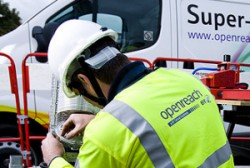Durham Extend BT Superfast Broadband Coverage to 96% with RCBF Money

The Digital Durham and Tees Valley project in North East England has confirmed new funding with BT and the Rural Community Broadband Fund (RCBF) that will push their existing superfast broadband (25Mbps+) coverage target up from 94% to 96% by September 2016.
At present the councils joint investment of £24m with BT and the Government’s Broadband Delivery UK (BDUK) office should make superfast speeds available to 94% by the same date, but today’s expansion sees more than £1m being added to the pot via the struggling Rural Community Broadband Fund (RCBF). On top of that an additional investment of £300k will be made by project partner BT.
Advertisement
Some 3,500 more homes and businesses are now expected to benefit from the new investment, which equates to a total of around 72,000 premises across the project as a whole. It’s also worth pointing out that while 96% will get “superfast” speeds (congratulations to Durham for being one of the few councils to clarify this) some 98% will still be brought within reach of BT’s “high-speed fibre broadband” (FTTC/P) network (i.e. the 2% different will receive sub-24Mbps).
Jane Brown, Durham Councillor for Corporate Services, said:
“We know that access to fast broadband speeds is still a problem in some parts of the County, particularly more rural areas, so it is fantastic news that this funding bid has been approved.
Effective broadband is key in modern communication and bringing economic growth to County Durham. Benefits to residents and businesses are enormous and SMEs in particular will be able to take advantage of new opportunities leading to regeneration and job creation.”
It’s little surprise to see BT winning another RCBF bid, especially while smaller altnet ISPs continue to struggle with the issue of identifying whether or not their own projects conflict with the BT/BDUK scheme. Getting access to the BT/BDUK coverage data remains a problem area for many altnets but it’s also necessary to satisfy the state aid rules.
However it’s interesting to see that Durham appears to have conflated their BDUK project so directly with the RCBF scheme and without revealing many details about precisely where, when and what the RCBF bid is being used to fund. After a little digging though we did at least discover that the RCBF bid was focused on the Teesdale and Weardale areas and more FTTC deployments would be a safe bet to make.
Mark is a professional technology writer, IT consultant and computer engineer from Dorset (England), he also founded ISPreview in 1999 and enjoys analysing the latest telecoms and broadband developments. Find me on X (Twitter), Mastodon, Facebook, BlueSky, Threads.net and Linkedin.
« UK ISP Pulse8 Scraps 12 Month Contracts for FTTC Superfast Broadband






















































Comments are closed